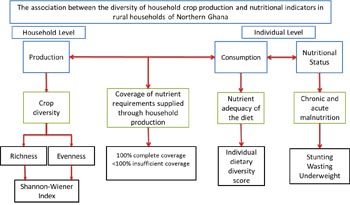We investigated how household production diversity is correlated with dietary diversity and nutrition of infants and young children living in rural farming communities in northern Ghana.
 |
The nutrition indicators included: (i) coverage of household nutrient requirements supplied through household production (ii) the individual dietary diversity score and (iii) the nutritional status of children 6 to 23 months old. Data was used from an earlier quantitative dietary intake study conducted by Ilse de Jager and others in Karaga district in Northern Ghana among 400 households (see Podcaster 31). Figure left: The study design shows how indicators are linked to production and consumption (Argyropoulou. 2015) |
We found that higher household crop production diversity is associated with higher coverage of nutrient needs of household members by household production. Looking at the coverage of nutrient requirement supplied through household production, only 43.4 percent of micronutrients supplied covered the daily requirements of all members of a household. Vitamin A, vitamin C, vitamin B2, vitamin B12, calcium and folate were not covered in the household production. The study did not show associations between diversity of household production and dietary diversity of children 6 to 23 months or nutrition status of these children. This suggests that household production diversity does not necessarily translate into improved diets of infants and young children. However, markets may play an important role in this relation. Future research could include further insight on markets influence on food consumption, income expenditure and intra-household distribution of food to determine the potential of household production diversity to affect the dietary quality of infants and young children 6-23 months in rural areas of sub-Saharan Africa. Sofia’s internship report can be found here.
Sofia Argyropoulou and Ilse de Jager
Sofia Argyropoulou just completed her MSc in Human Nutrition at Wageningen University. She did her internship for the Netherlands Environmental Assessment Agency (PBL) in collaboration with the Slow Food organization, conducting a literature review on agriculture and nutrition.
